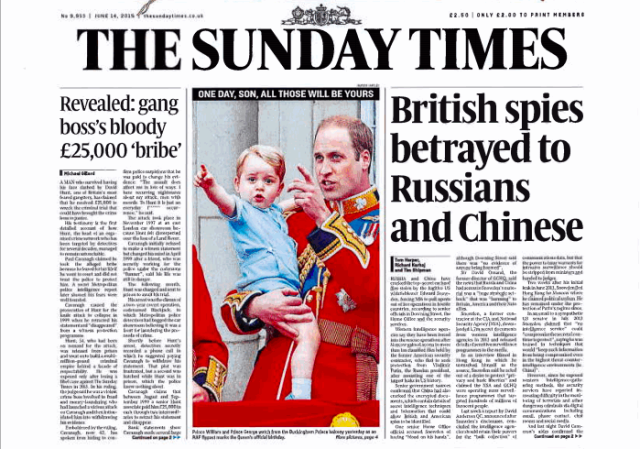
The Sunday Times dropped a bombshell this weekend, reporting that the top secret files leaked by Edward Snowden have been obtained by the Russian and Chinese governments. The story claimed Western intelligence agencies were "forced into rescue operations" to mitigate the damage, and one UK government source claimed that Snowden had "blood on his hands."
It would be a major blow to Snowden and the journalists who worked with him—if it were true. But the bold claims started falling apart shortly after it was published this weekend. The story is behind a paywall but available elsewhere. It's based entirely on anonymous British officials and contains some glaring inaccuracies.
Snowden confidante Glenn Greenwald immediately attacked it as "journalism at its worst." Greenwald is a predictable critic, to be sure, but Times reporter Tom Harper was later questioned about his story on CNN and admitted he's been unable to check out any of the far-reaching claims told to him by government sources. The reporter answered one question after another with some version of "I don't know," admitting he has no idea how any "hack" took place, how or when any foreign governments got the files, or if the files were encrypted at all. Harper simply maintained that the Snowden hacking story was the "official position of the British government."
This morning, lawyers at Times Newspapers took a step to limit Greenwald's criticism, sending a notice telling The Intercept that Greenwald's story, which included a low-res image of the Times' front page, violates their copyright. The Intercept quickly published the takedown notice, and on Twitter Greenwald made clear that his publication won't be deleting his copy of the Times' "humiliating headline."
The relevant portions of the copyright letter, from the legal department of Times Newspapers, reads:
We write on behalf of Times Newspapers Limited (TNL) the publisher of The Times and The Sunday Times. TNL owns the copyright in the typographical arrangement of the front page of The Sunday Times published on 14 June 2015 (Material). The Material is an original work created by employees of TNL. A copy of the Material is enclosed.
A copy of the Material appears at [link] under the headline: SUNDAY SNOWDEN STORY IS JOURNALISM AT ITS WORST—AND FILLED WITH FALSEHOODS (Infringing Content). The Infringing Content has been reproduced, communicated to the public and published onto the Website without permission and as such infringes the intellectual property rights of TNL. A copy of the Infringing Content is enclosed.
The "infringing" picture of The Sunday Times' front page, reproduced in part, above, doesn't have sufficient resolution to allow the article to be read. And Greenwald didn't reproduce the Times story in full, although considering how much he had to say about the piece, doing so would likely be well within his rights.
The Sunday Times legal department didn't respond to Ars' request for comment on the DMCA notice.
Errors and omissions
The Times' behavior since publication has become a perfect example of why outside criticism and fact-checking are so necessary. The article's most glaring error, a statement that Greenwald's partner David Miranda visited Snowden in Moscow, was deleted without any notice. A Times spokesperson promised there will be a correction in this Sunday's edition.
Critics have pointed to numerous inconsistencies in the Sunday Times piece, including the fact that the piece misuses the terms "agents" and "officers," which have specific meanings in the context of British intelligence.
The story asserts that it isn't clear "whether Russia and China stole Snowden’s data, or whether he voluntarily handed over his secret documents." Of course, if Snowden handed over the documents willingly, it isn't clear why they would need to be "cracked" by foreign governments in the first place. Further, Snowden and the journalists working with him have stated he kept no files after handing them to journalists in Hong Kong.
The quote suggesting Snowden has "blood on his hands" is immediately followed by a statement noting that there was "no evidence of anyone being harmed."
Other critics have suggested that the story's timing is no coincidence, having come just days after a 373-page report was published in the UK critical of the nation's terrorism laws. The report's author, David Anderson, called the current system "undemocratic, unnecessary, and in the long run, intolerable."
Carl Sagan famously said "extraordinary claims require extraordinary proof." Journalism isn't exempt. The Times has published a story that's evidence-free and raises questions about the practice of using anonymous sources as the sole foundation of reporting. Greenwald has lambasted the story as "pure stenography," a critique that the story's authors have not rebutted.
reader comments
139